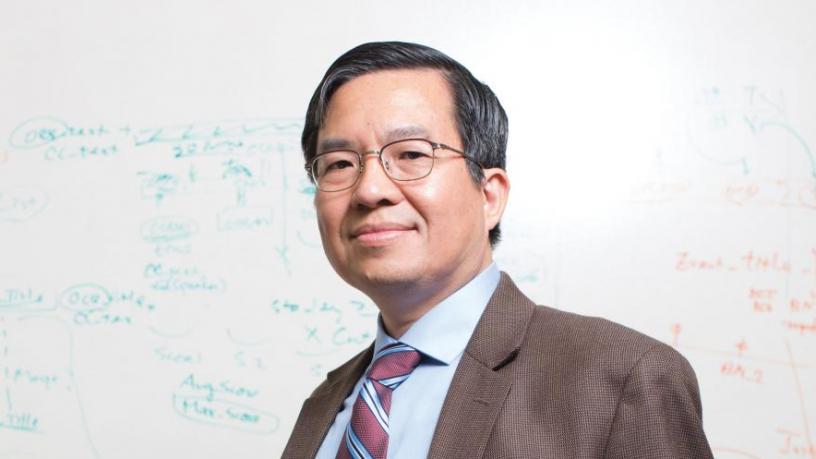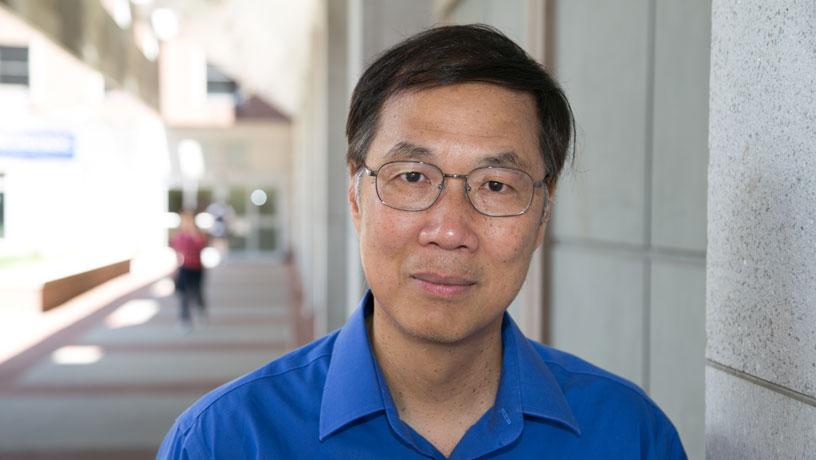Professors Shih-Fu Chang and Kam Leong Elected to Academia Sinica
Two Columbia Engineering faculty have been elected to the prestigious Academia Sinica of Taiwan, founded in 1928 to promote and undertake scholarly research in science, engineering and humanities. The Academician recognition, open to scientists and scholars both domestic and overseas, represents the highest scholarly honor in Taiwan. The Academy counts seven Nobel laureates among its fellows.

Shih-Fu Chang, senior executive vice dean, the Richard Dicker Professor of Telecommunications, and professor of electrical engineering and of computer science
Shih-Fu Chang, senior executive vice dean, the Richard Dicker Professor of Telecommunications, and professor of electrical engineering and of computer science, and Kam W. Leong, Samuel Y. Sheng Professor of Biomedical Engineering, were both recognized for their contributions to the field of engineering. In total, 21 new fellows were announced at the academy’s biennial Convocation of Academicians held in early July. Only five researchers were honored in the Division of Engineering Sciences. Columbia Engineering also boasts two additional faculty who have previously been inducted as Academicians of Academia Sinica, Prof. Van C. Mow of Biomedical Engineering and Prof. Wen Wang of Electrical Engineering.
“This is a wonderful recognition of the many achievements of these two outstanding researchers who are both leading scholars in their respective fields,” said Mary Boyce, Dean of Columbia Engineering. “And to see Columbia faculty prominently recognized as two of the five new members in the engineering division is a testament to the global impact of the work done here.”
Chang, who joined Columbia Engineering in 1993, is a pioneer in multimedia information retrieval, computer vision, and machine learning. As director of the Digital Video Multimedia Lab, Chang develops intelligent methods and systems for extracting information from visual content and multimedia in order to render massive quantities of unstructured data searchable. His research results have been used in major applications such as professional video search and human trafficking crime prevention. Several startups have emerged from his lab. In addition, as Columbia Engineering’s senior executive vice dean, Chang plays a key role in the School’s strategic planning, special research initiatives, international collaborations, and faculty development.
“I am extremely humbled and honored to be included in this distinguished group and I look forward to contributing to the common cause of Academia Sinica and Columbia Engineering,” says Chang, who is also a member of Columbia’s Data Science Institute.
Chang has won numerous awards, including the IEEE Signal Processing Society Technical Achievement Award, the ACM Multimedia Special Interest Group Technical Achievement Award, the IEEE Kiyo Tomiyasu Award, and the Honorary Doctorate of University of Amsterdam. For his dedicated contributions to education, he received the Great Teacher Award from the Society of Columbia Graduates in 2013, an honor given annually to professors for exemplary undergraduate teaching at Columbia College and Columbia Engineering. In 2016, he was ranked by Aminer as the most influential scholar in the field of multimedia. He is also a Fellow of the American Association for the Advancement of Science, IEEE, and the Association for Computing Machinery.

Kam W. Leong, Samuel Y. Sheng Professor of Biomedical Engineering
Leong—an expert in biomaterials, nanomedicine, gene editing and tissue engineering—joined the faculty in 2014, and also holds an appointment in the Department of Systems Biology. As head of the Nanotherapeutics & Stem Cell Engineering Lab, his group currently seeks innovative treatments for neurogenerative diseases through direct cellular reprogramming and gene editing. A renowned researcher in nanoscale therapeutics, Leong successfully developed nonviral gene delivery systems for hemophilia and genetic immunization. Currently, he works at the interface of nanotherapeutics and regenerative medicine to develop new treatment strategies for inflammatory diseases and cancer. One of his recent research directions is the development of human cell-based tissue-chips for drug development, disease modeling, and precision medicine.
“I am humbled and honored to be elected to such a distinguished body. Naturally the honor belongs to the collective effort of students, postdoctoral fellows, and collaborators over the years. There is so much more science to be done and I look forward to working with them for years to come,” said Leong.
Leong was previously elected to the National Academy of Engineering (2013) and the National Academy of Inventors (2013). He has received the Lifetime Achievement Award from the Chinese American Society of Nanotechnology & Nanomedicine, the President’s Fellowship for Distinguished Scientist from the Chinese Academy of Sciences, 2015 Savio L-Y. Woo Distinguished Lectureship from the World Association for Chinese Biomedical Engineers, and the Distinguished Scientist Award from the International Journal of Nanomedicine, among many other honors.
Two other Columbia professors were among five fellows recognized by the Academia Sinica in the Division of Humanities and Social Sciences. Dorothy Ko, chairs the Department of History at Barnard College, and specializes in the history of Ming-Ch’ing China, and in the history of women and gender, the history of science and technology, and the history of art. Chun-Fang Yu, Sheng Yen Professor Emerita of Chinese Buddhist Studies, specializes in the transformation of Buddhism in China. She is a faculty member in Religion and East Asian Language and Cultures.
